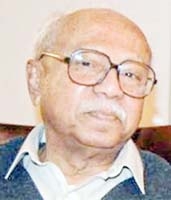
Mohammad Amjad Hossain :
Poet Kazi Nazrul Islam seems to be possibly the only poet who wrote on down-trodden people and fought against the British which occupied the Indian sub-continent from 1858 to 1947. Possibly only book was published in German on Poet Nazrul Islam for the first time during my stay in Germany 1999 at the initiative of a group of Bangladeshi-cum German where I was assigned as Counsellor in the Bangladesh embassy, Bonn. A group of Bangladeshi-German including Dr Golam Abu Zakaria, Professor Sujit Chowdhuy, Aftab Hossain Sunil took the initiative edited by Dr. Hans Harder, who got doctorate degree on Bankim Chandra Chattopadhyay. Dr. Hans Harder studied Indology and Social Anthropology whom I met twice in Germany who is now teaching at Heidelberg University. Dr. Hans Harder also spoke with me about my article: Nazrul and anti-establishment journalism which was included in the book. This is the only book in German on Kazi Nazrul Islam.
Kazi Nazrul Islam began his journey by publishing bi-weekly magazine ‘Dhumketu (Comet)’ in 1922. As its Editor, Kazi Nazrul Islam wrote against the oppression and injustice of the British ruler in India who ruled the country from 1858 to 1947.
The magazine Dhumketu practically evoked sharp reaction of the British resulting in Kazi Nazrul Islam was prosecuted on sedition charge but he did not defend himself who gave a long statement explaining his position which was later published under the title Rajbandhir Jabanbandhi (Confessing of the Royal Prisoner). The statement of Poet Nazrul Islam turned out to be a piece of excellent literature indeed. One is tempted to quote here: “I am on trial for sedition. The Royal crown is pitted against the comet’s flame. The accuser is King, scepter in hand; the accused is truth, justice in hand. The King supported by his salaried servants; my support is ever-awake God who is truth eternal, and the King of kings and the judge of judges. The king’s voice is but a bubble, but mine is a limitless ocean, for I am Poet sent by God to express unexpected truths but to give shape to shapeless creation. India is now in bondage. This is undiluted truth. But under the present administration, it is sedition to call a slave a slave and to describe wrong a wrong. Can such administration last long? Am I guilty simply because an anguished call of captive truth found expression in my voice? But mine is but the agonized cry of the universal oppressed soul. The cry cannot be suppressed by coercing me. It will be ringing again in somebody else throat”.
Indeed, the quality of the efforts that Kazi Nazrul Islam put into bringing out standard bi-weekly can be gauged from the Memoirs of renowned writer Achintya Kumar Sengupta who is on record saying “on Saturday evening, we would like many others, wait at Jagu Babu’s market for hawker to come with his bundle of Dhumketu. As soon as hawker scramble started to reach for the paper, perhaps we thought the editorial pen dipped in blood and not ink. What a language? They were not written to be read alone or read once.” The comment by renowned writer reflects how powerful writer was Kazi Nazrul Islam.
While in jail Kazi Nazrul Islam went on hunger strike who resisted the request from many friends to give up hunger strike but he did not honor their request but when Poet Rabindranath Tagore sent telegram to Nazrul Islam in jail, sayng ,” give up the hunger strike; our literature claims you”. Since Nazrul Islam treated Rabindranath as Guru he broke the hunger strike and got released on completion one year term. Another venture was the publication of weekly Langol (Plough) in 1925. This weekly publication in fact projected the viewpoints of the Labor Swaraj group of The Indian National Congress. In fact, this group was committed to the independence of India on the theory of equality of all men and women in political, social and economic emancipation. Incidentally as many as 16 issues of Langol appeared but later it changed into Gana-Vanee (The Voice of the masses). When Nazrul started editing the paper ‘Gana-Vanee’, communal riots were the order of the day in 1926. Kazi Nazrul Islam wrote editorial voicing against religious fanatism and underscoring the need for communal harmony in the country. Since 1923 there have been as many as 79 riots in Bihar, Bengal, Punjab and Delhi till 22 August of 1926.
In 1920 Kazi Nazrul Islam was appointed as one of the Editors of Navajug (New Age) whose proprietor was renowned politician and lawyer Sher-e- Bangla AK Fazlul Huq while another editor was Comrade Muzaffar Ahmed. Kazi Nazrul Islam proved his worth and competence in writing editorial columns as well as copy-editing plus editing news and features for Navajug. There appears to be contrast between proprietor and editors of Navajug. While proprietor intended to project his image as politician but both the editors tended to disseminate the ideology and the message of social revolution. As a result, the views of the newspaper incurred displeasure of the British government. The newspaper ceased publication since the government forfeited the security deposit. That reflected the colonial trend of the British government to silence the free press. On persuasion by AK Fazlul Haq, the government demanded a large amount of money as security deposit to resume the publication of Navajug. Navajug reappeared again in 1941 when AK Fazlul Haq become Chief Minister of Bengal while Kazi Nazrul Islam joined as Chief Editor but could not serve the Navajug for long since he became sick following his wife became paralyzed and Nazrul Islam began losing his voice. That the end of journalistic career of Kazi Nazrul Islam.
(Mohammad Amjad Hossain, retired diplomat from Bangladesh and former President of Nova Toastmaster International club of America, writes from Falls Church, Virginia).

